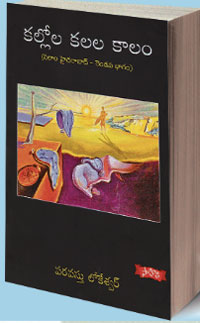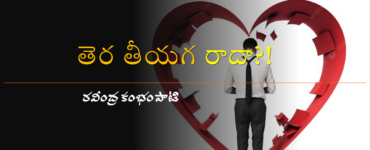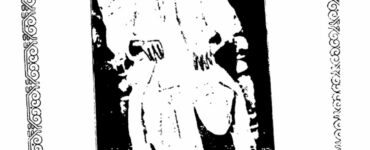Review of Kallola Kalala Kaalam by Paravasthu Lokeshwar. Sahithi Prachuranalu, pages 523, Rs 350.
Chronicles are a genre apart. They are accounts of the times as seen and recorded by the contemporary writer. Such accounts of events and incidents of import, are generally shorn of personal experiences, aspirations, and achievements of the chronicler. Perceptive observations interspersed with anecdotes constitute the corpus of a chronicle. Paravasthu Lokeshwar’s Kallola Kalala Kaalam (2019) is a cross between a chronicle and a fictionalized account of the protagonist’s life lived through times marked by trials and tribulations. The protagonist is at once an observer and a participant. He is a player and a spectator, a character, commentator, and critic all at the same time. His ideals and outlook on life constantly clash with the reality around him, obliging him to constantly re-form his life in line with life’s vicissitudes.
Swamy, the protagonist, is a rebel by nature. He questions conventions and defies definitions. As a young man he is fascinated by theories of class conflict and dialectical method of inquiry. He enrols himself as a member of the political party that espouses these theories and vows to establish a new order. He gets down to what he is good at doing – educating, organizing, and internalizing the ideas and ideals. To him, no dichotomy exists between precept and practice. But the reality is quite otherwise. He discovers many Janus-faced comrades in the party, and their pettiness and duplicity perplex and dishearten him. Unable to survive in such a suffocating environment, he quits the party and stands at the crossroads. Fate finds him a government job, but its narrow confines do not afford him the freedom of enquiry he is used to. He quits the job and goes back to trade unionism, and earns his share of success in securing for the oppressed their due and human dignity. In the years that follow, his life becomes a roller-coaster. He keeps returning to the crossroads whenever his ideals and aspirations clash with the ground realities, until he revisits and re-frames his ideas about life and living. He realizes that one should align one’s ideas and goals of living with the changing ideals of life.
The narrative spanning two decades alludes to political upheavals at the state and the national levels. Swamy is not merely concerned but distraught at the falling standards of political polemics and practices. If the Emergency was a dark chapter in the contemporary history of India, the failure of Janata Party and Jayaprakash Narayan’s “total revolution”, proved a political disaster for the likes of Swamy. Other episodes like Operation Blue Star and the subsequent massacre of the Sikhs in the streets of Delhi were so gory that even die-hard optimists of India’s communal harmony went speechless. Swamy also captures the turn of events on the political horizon of the state, and the changing political alignments. He traces the rise of TDP and its caste and class ramifications. Even as he chronicles the public events, Swamy synchronizes them with the changing fortunes of his own life, and his personal tryst with destiny. The reader does not find any disjunction in the protagonist’s experiences in the public and the private domains.
The narrative is also peppered with asides—about places Swamy visits, persons he meets, and not the least, the one he courts. There are brief amorous interludes which the author handles sensitively and deftly. Executing a chronicle-cum-fictionalized autobiography is a tricky task, but the author accomplishes it with a certain degree of confidence. The narrative flow is generally smooth, except that at places it gets a tad tedious and repetitive because of the volume of events it seeks to cover. But the author throws in copious couplets and lines from popular film songs as if to relieve the reader from the graveness of the events. There are also traces of self-approbation which the author would have done well to avoid.
The work is touted as Part-II of Lokeshwar’s well-received work Salam Hyderabad (2005). But with little or nothing about Hyderabad or even about Telangana in this book, the reader is left wondering whether he is tricked into reading a work that should have demanded a reader’s attention on its own merit. That question leaves the reader at a crossroads.
*









Add comment